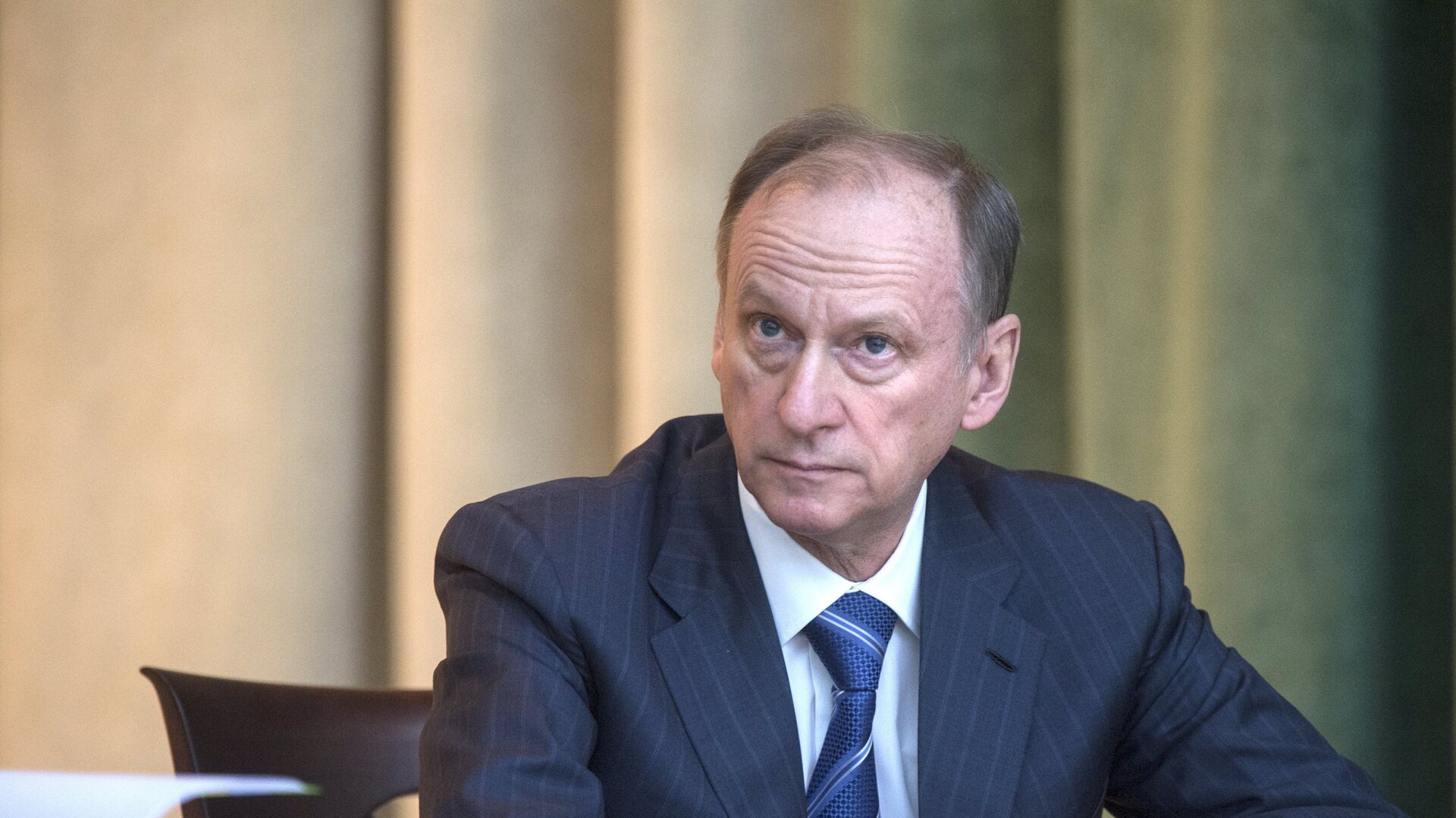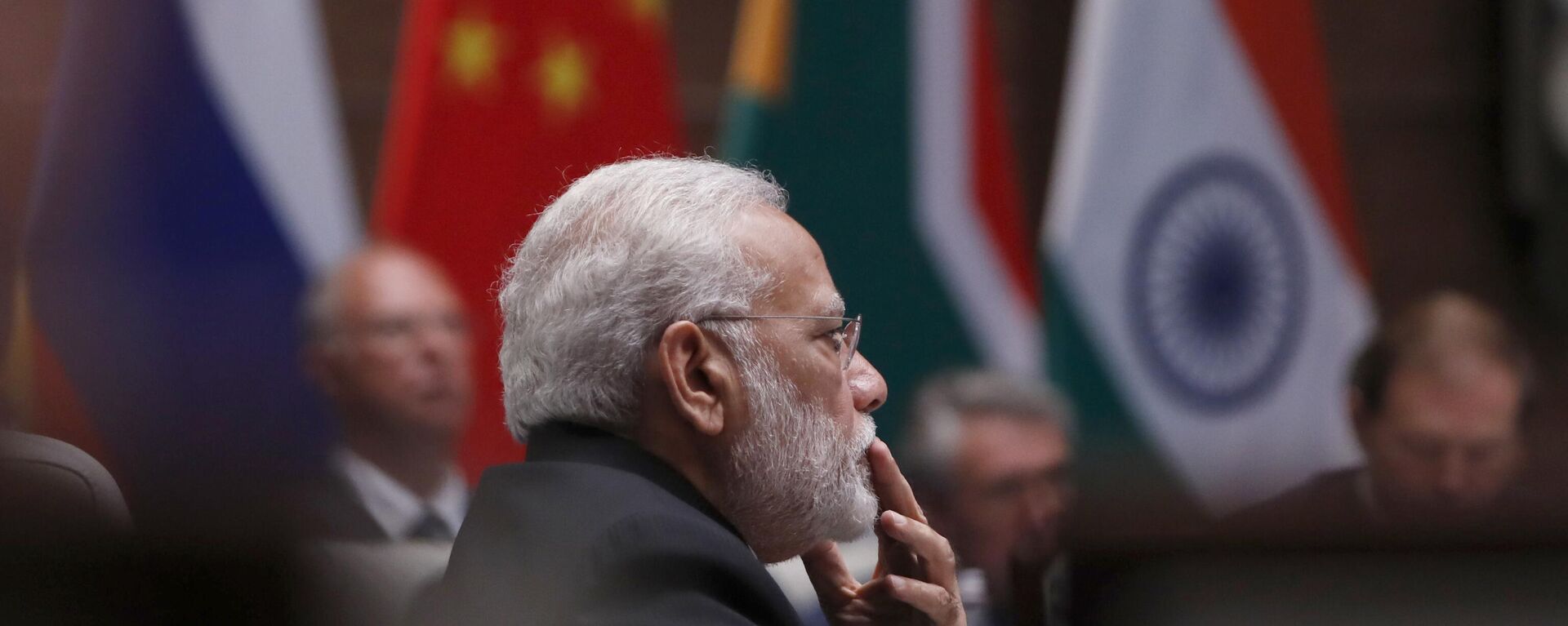https://sputniknews.in/20230724/brics-non-confrontational-agenda-is-behind-its-rising-popularity-russian-security-chief-3162079.html
BRICS’ Non-Confrontational Agenda Is Behind Its Rising Popularity: Russian Security Chief
BRICS’ Non-Confrontational Agenda Is Behind Its Rising Popularity: Russian Security Chief
Sputnik India
The surging popularity of the BRICS grouping—Brazil, Russia, India, China and South Africa—is because of the fact that it doesn’t have a “confrontational or a hidden agenda”, said Nikolai Patrushev.
2023-07-24T20:14+0530
2023-07-24T20:14+0530
2023-08-03T11:11+0530
world news
nikolai patrushev
brics
russia
india
china
south africa
us
vladimir putin
narendra modi
https://cdn1.img.sputniknews.in/img/07e7/02/08/797429_0:0:2877:1618_1920x0_80_0_0_d202571db4e7d80cb845c9a580b3a4c8.jpg
The surging popularity of the BRICS grouping—Brazil, Russia, India, China and South Africa—is because of the fact that it doesn’t have a confrontational or a hidden agenda, Nikolai Patrushev, the Secretary of the Russian Security Council, told a meeting of National Security Advisor (NSA)-level meeting of the grouping in Johannesburg on Monday.“This helps our countries always find common ground and mutually acceptable solutions even on the most difficult issues. This approach is already bearing fruit and impresses like-minded people across the world," the top Russian security official added.Patrushev said that involving a range of countries in the BRICS’ framework and the creation of a permanent cycle of friends would help the developing nations to find solutions to common developmental challenges across various areas, including in security.The meeting was chaired by Khumbudzo Ntshavheni, the minister in South African Presidency responsible for the state security, and attended by other BRICS counterparts, including Indian Prime Minister Narendra Modi’s National Security Advisor Ajit Doval and Wang Yi, Director of the Office of the Foreign Affairs Commission of the Communist Party of China (CPC) among others.Top security officials from Belarus, Burundi, Cuba, Iran, Saudi Arabia, and the United Arab Emirates (UAE) also participated in the meeting, as per information with the South African presidency.Preventing US Diktat in International Relations in Global InterestPatrushev said that the prevention of US diktat in international relations was in the common interest of all sovereign states.’Patrushev underlined that the world order was undergoing “significant changes” and that it was moving towards a “multipolar world order”.Citing Russian President Vladimir Putin, Patrushev noted that the trend of multipolarity was backed by the principles of “trust and the indivisibility of security”.
https://sputniknews.in/20230720/slow-and-considerate-expansion-will-add-heft-to-brics-ex-envoy-says-3112089.html
russia
india
china
south africa
us
Sputnik India
feedback.hindi@sputniknews.com
+74956456601
MIA „Rossiya Segodnya“
2023
Sputnik India
feedback.hindi@sputniknews.com
+74956456601
MIA „Rossiya Segodnya“
News
en_IN
Sputnik India
feedback.hindi@sputniknews.com
+74956456601
MIA „Rossiya Segodnya“
Sputnik India
feedback.hindi@sputniknews.com
+74956456601
MIA „Rossiya Segodnya“
brics summit, brics meeting brics nsa meeting, brics bank, brics expansion, brics currency, brics current president, russia brics, russia defense budget
brics summit, brics meeting brics nsa meeting, brics bank, brics expansion, brics currency, brics current president, russia brics, russia defense budget
BRICS’ Non-Confrontational Agenda Is Behind Its Rising Popularity: Russian Security Chief
20:14 24.07.2023 (Updated: 11:11 03.08.2023) South Africa’s BRICS’ sherpa Anil Sooklal revealed last week that 70 non-western countries, including all African heads of state, have been invited to the BRICS Summit next month.
The surging popularity of the BRICS grouping—Brazil, Russia, India, China and South Africa—is because of the fact that it doesn’t have a confrontational or a hidden agenda, Nikolai Patrushev, the Secretary of the Russian Security Council, told a meeting of National Security Advisor (NSA)-level meeting of the grouping in Johannesburg on Monday.
"A
culture of dialogue has been formed due to years of
cooperation among the five countries. Open and trusting relationships have developed, which are based on the principles of sovereign equality, respect for the choice of their own path of development and consideration of each other's interests,” Patrushev said, as per the press service of the Russian Security Council.
“This helps our countries always find common ground and mutually acceptable solutions even on the most difficult issues. This approach is already bearing fruit and impresses like-minded people across the world," the top Russian security official added.
Patrushev said that involving a range of countries in the BRICS’ framework and the creation of a permanent cycle of friends would help the developing nations to find solutions to common developmental challenges across various areas, including in security.
The meeting was chaired by Khumbudzo Ntshavheni, the minister in South African Presidency responsible for the state security, and attended by other BRICS counterparts, including Indian Prime Minister Narendra Modi’s National Security Advisor Ajit Doval and Wang Yi, Director of the Office of the Foreign Affairs Commission of the Communist Party of China (CPC) among others.
Top security officials from Belarus, Burundi, Cuba, Iran, Saudi Arabia, and the United Arab Emirates (UAE) also participated in the meeting, as per information with the South African presidency.
Preventing US Diktat in International Relations in Global Interest
Patrushev said that the prevention of US diktat in international relations was in the common interest of all sovereign states.’
“In the modern political and economic architecture of the world, an increase in the representation of the countries of Asia, Africa, Latin America and the Middle-East, pursuing an independent foreign policy and ready to defend national interests and their sovereignty in the institutions of global governance, are increasingly in demand," he said.
Patrushev underlined that the world order was undergoing “significant changes” and that it was moving towards a “multipolar world order”.
Citing Russian
President Vladimir Putin, Patrushev noted that the
trend of multipolarity was backed by the principles of “trust and the indivisibility of security”.
“Unfortunately, this objective trend is being categorically rejected by the Western minority. In an attempt to maintain their world domination, the West does not shun any means, from unilateral sanctions to waging hybrid wars,” Patrushev remarked.


